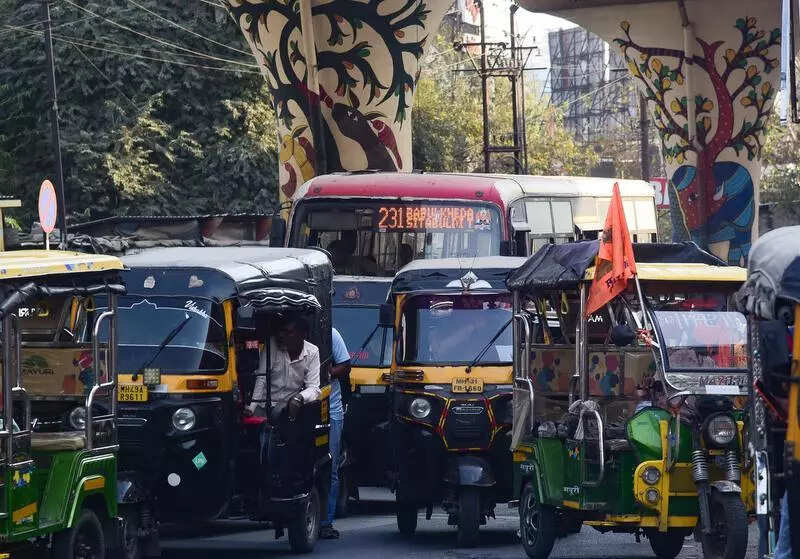Nagpur: Over 1.4 lakh Nagpurians depend on Nagpur Municipal Corporation‘s (NMC) Aapli Buses for daily commuting. However, frequent traffic congestion is severely disrupting operations, leading to trip cancellations, loss of revenue, and inconvenience for passengers. Data analysed in the first fortnight of this month shows the growing challenges faced by the city’s public transport system.
A study of daily operations of Aapli Bus fleets by NMC’s transport department revealed that congestion on city roads significantly impacted bus punctuality and trip frequency. On February 3, traffic jams caused a loss of 249.6 km, affecting 14 trips. The situation worsened on February 6, when out of 80,480 km scheduled, 1,057 km were lost, disrupting 45 trips.
By February 10, traffic delays resulted in a loss of 936 km, affecting 41 trips. The highest disruption was recorded on February 12, with an overall loss of 7,500 km, out of which 1,324.4 km were due to congestion, impacting 44 trips. Such delays affect passenger schedules, reduce operational efficiency, and increase fuel consumption.
The persistent traffic jams are primarily caused by ongoing infrastructure projects, encroachments by roadside vendors, and a severe lack of parking spaces. With construction materials required for infrastructure projects often occupying road space, vehicle movement slows down significantly, affecting Aapli Bus schedules, said NMC officials.
Despite periodic anti-encroachment drives, vendors return to occupy roads and footpaths, forcing vehicles into narrower lanes and leading to bottlenecks. Areas like Jhansi Rani Square, Sitabuldi and Central Avenue experience heavy congestion due to such encroachments, added the officials.
Even commercial buildings fail to provide adequate parking, forcing vehicle owners to illegally park on roads, further reducing driving space and creating traffic snarls. This issue is particularly severe in business districts like Dharampeth, Sadar, and Itwari.
Key performance indicators such as Earnings Per Kilometre (EPKM) and Earnings Per Bus (EPB) have fluctuated due to delays. On February 3, the EPKM was 31.18, and the EPB stood at 6,314. By February 6, the EPKM increased to 32.14, but the EPB dropped to 6,066, reflecting operational inefficiencies.
On February 10, the EPKM further improved to 32.59, and the EPB was 6,308, suggesting minor recovery. However, by February 12, the EPKM dropped to 28.12, and the EPB declined to 5,825, indicating the financial strain caused by traffic-induced delays and trip cancellations.
With 469–475 buses operating daily, Aapli Bus remains a vital transport mode in Nagpur. Unless traffic congestion is managed effectively, delays will continue to affect service quality and revenue. Experts suggest solutions such as dedicated bus lanes, stricter traffic enforcement, better urban planning, and the development of multi-level parking facilities to ease congestion.
A study of daily operations of Aapli Bus fleets by NMC’s transport department revealed that congestion on city roads significantly impacted bus punctuality and trip frequency. On February 3, traffic jams caused a loss of 249.6 km, affecting 14 trips. The situation worsened on February 6, when out of 80,480 km scheduled, 1,057 km were lost, disrupting 45 trips.
By February 10, traffic delays resulted in a loss of 936 km, affecting 41 trips. The highest disruption was recorded on February 12, with an overall loss of 7,500 km, out of which 1,324.4 km were due to congestion, impacting 44 trips. Such delays affect passenger schedules, reduce operational efficiency, and increase fuel consumption.
The persistent traffic jams are primarily caused by ongoing infrastructure projects, encroachments by roadside vendors, and a severe lack of parking spaces. With construction materials required for infrastructure projects often occupying road space, vehicle movement slows down significantly, affecting Aapli Bus schedules, said NMC officials.
Despite periodic anti-encroachment drives, vendors return to occupy roads and footpaths, forcing vehicles into narrower lanes and leading to bottlenecks. Areas like Jhansi Rani Square, Sitabuldi and Central Avenue experience heavy congestion due to such encroachments, added the officials.
Even commercial buildings fail to provide adequate parking, forcing vehicle owners to illegally park on roads, further reducing driving space and creating traffic snarls. This issue is particularly severe in business districts like Dharampeth, Sadar, and Itwari.
Key performance indicators such as Earnings Per Kilometre (EPKM) and Earnings Per Bus (EPB) have fluctuated due to delays. On February 3, the EPKM was 31.18, and the EPB stood at 6,314. By February 6, the EPKM increased to 32.14, but the EPB dropped to 6,066, reflecting operational inefficiencies.
On February 10, the EPKM further improved to 32.59, and the EPB was 6,308, suggesting minor recovery. However, by February 12, the EPKM dropped to 28.12, and the EPB declined to 5,825, indicating the financial strain caused by traffic-induced delays and trip cancellations.
With 469–475 buses operating daily, Aapli Bus remains a vital transport mode in Nagpur. Unless traffic congestion is managed effectively, delays will continue to affect service quality and revenue. Experts suggest solutions such as dedicated bus lanes, stricter traffic enforcement, better urban planning, and the development of multi-level parking facilities to ease congestion.


